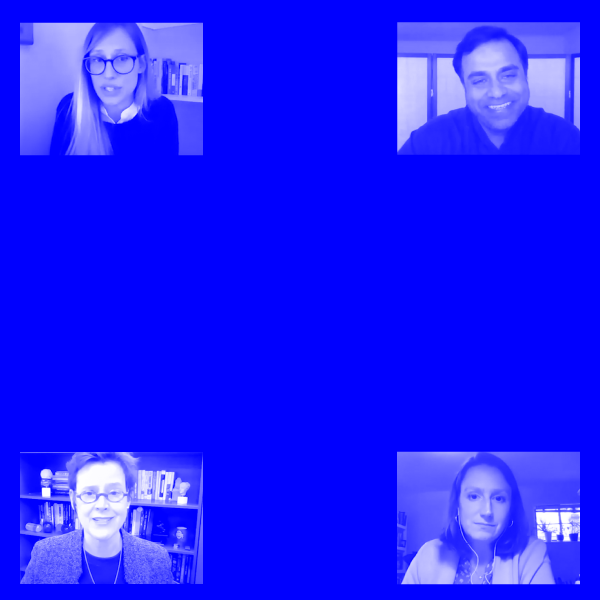Amanda Lenhart (Host)
Amanda Lenhart studies how technology affects human lives, with a special focus on families and children. A quantitative and qualitative researcher, Amanda is the Health + Data Research Lead at the Data & Society Research Institute. Over decades, she has examined how adolescents and their families use and think about technology, how young adults consume news, how harassment has thrived in online spaces, and how automation will impact workers. Most recently, as deputy director of the Better Life Lab at New America, Amanda focused on the ways technology affects workers’ jobs and lives, as well as the family-supportive policies that enable balance between the personal and the professional. She began her career at the Pew Research Center, studying how teens and families use social and mobile technologies.
Amanda specializes in translating rigorous research for a broad national audience. Dedicated to public communication, she has testified before congressional subcommittees and the Federal Trade Commission. Amanda’s work has been featured in numerous national publications and broadcasts, including the PBS Newshour and NPR’s All Things Considered.
Imogen Parker (Co-Host)
Imogen is Head of Policy at the Ada Lovelace Institute, where she is responsible for creating social change through developments to policy, law, regulation and public service delivery. She is a Policy Fellow at Cambridge University’s Centre for Science and Policy.
Her career has been at the intersection of social justice, technology and research. In her previous role as Head of the Nuffield Foundation’s programmes on Justice, Rights and Digital Society she worked in collaboration with the founding partner organisations to create the Institute. Prior to that she was acting Head of Policy Research for Citizens and Democracy at Citizens Advice, Research Fellow at the Institute for Public Policy Research (IPPR) and worked with Baroness Kidron to create the children’s digital rights charity 5Rights.
Ranjit Singh (Panelist)
Ranjit Singh has a doctorate in Science and Technology Studies (STS) from Cornell University. His research lies at the intersection of data infrastructures, global development, and public policy. He uses methods of interview-based qualitative sociology and multi-sited ethnography in his research. He examines the everyday experiences of people subject to data-driven practices and follows the mutual shaping of their lives and their data records. His dissertation research on Aadhaar, the national biometrics-based identification infrastructure of India, advances the public understanding of the affordances and limits of biometrics-based data infrastructures in practically achieving inclusive development and reshaping the nature of Indian citizenship.
He has published his research in venues such as the Journal of South Asian Studies and the ACM CHI Conference; he has presented his work at conferences including CSCW, 4S, AAA, and ECSAS. Beyond the dissertation, he has focused on two additional infrastructures: (1) the National Register of Citizens in Assam, India—an effort to differentiate citizens from illegal immigrants. (2) US Credit Scoring—the efforts of low-income individuals to improve their creditworthiness within the lending industry. In all these projects, his research is oriented towards understanding how data is increasingly used to imagine and develop new digital solutions for democratizing inclusion. He was also involved in developing the Digital Due Process Clinic, a clinical program at Cornell University, to study and support individuals in their struggles to secure fair representation in data infrastructures.
Amy Lauren Fairchild (Panelist)
Amy Lauren Fairchild is a historian who works at the intersection of history, public health ethics, and public health policy and politics. Her work helped establish public health ethics—which is concerned with the well-being of populations—as fundamentally distinct from either bioethics or human rights. Whether exploring the tension between privacy and surveillance, immigration and border control, or paternalism and liberty, Fairchild assesses the social, political, and ethical factors that shape not only the potential and limits of the state to intervene for the common good but also what counts as evidence.
Fairchild has written two books: Science at the Borders: Immigrant Medical Inspection and the Shaping of the Modern Industrial Labor Force and Searching Eyes: Privacy, the State, and Disease Surveillance in America (with Ronald Bayer and James Colgrove). In addition, she has published in leading journals including the New England Journal of Medicine, Health Affairs, the American Journal of Public Health, Science, and the JAMA. The National Endowment for the Humanities funds her current book project: a social history of fear and panic.
A graduate of the Plan II Honors Program at the University of Texas at Austin, Fairchild received her MPH and PhD from Columbia University. She was on the faculty at Columbia for 22 years in the Department of Sociomedical Sciences at the Mailman School of Public Health. At Columbia, she served as Assistant Director for Academic Affairs in the Center for the History and Ethics of Public Health, Chair of the Department of Sociomedical Sciences, and Director of the Foundations module and Integration of Science and Practice in the MPH Core Curriculum. She continues to serve as Co-Director, with Ronald Bayer, of the World Health Organization Collaborating Center for Bioethics at Columbia’s Center for the History and Ethics of Public Health. Fairchild also served on the faculty at Texas A&M University. There, she was Associate Dean for Academic Affairs at the School of Public Health and Associate Vice President for Faculty and Academic Affairs at the Health Science Center.
Fairchild feels extraordinarily honored to serve as Dean of the College of Public Health at The Ohio State University. Any university with the chutzpah to have a poison nut for a mascot is the kind of place she wants to stay.


